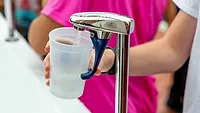PFAS Found in Eggs Laid by Hens that are Fed Contaminated Feed

Credit: PublicDomainPictures (publicdomainpictures-14) via Pixabay
Danish consumers, especially children, are at risk of significant exposure to per- and polyfluoroalkyl substances (PFAS) from eggs, according to research conducted by the DTU National Food Institute and the Danish Veterinary and Food Administration. The researchers believe that fishmeal used as feed is the most likely cause of PFAS contamination in eggs.
PFAS, also known as “forever chemicals,” are used in consumer goods and packaging. However, due to harmful human health effects associated with the substances, as well as their pervasive contamination of the environment, the use of PFAS is decreasing.
Due to the widespread contamination of water by PFAS, the researchers suspect that fishmeal-based organic feed, used to feed layer hens, is the source of PFAS transmission to eggs. PFAS were found in organic eggs from chicken farms all over Denmark, whereas the content was low in eggs from free-range, barn, and battery hens. Uniform concentrations and compositions of PFAS were found across large chicken flocks that consume organic feed.
The researchers also determined that children 4–9 years old who eat more than 2.5 organic eggs per week are at risk of harmful levels of PFAS exposure, based on the tolerable weekly intake (TWI) set by the European Food Safety Authority (EFSA). The TWI determined by EFSA is 4.4 nanograms per kilogram (ng/kg) of body weight per week. Among children who eat “many eggs” (5–6 eggs per week), the TWI is 10 ng/kg per week. Danish people’s total exposure to PFAS includes exposure from organic eggs in addition to exposure from many other foods and sources.
On January 1, 2023, the EU introduced maximum levels for four types of PFAS (PFOS, PFOA, PFNA, and PFHxS) in certain foods, including eggs, fish and fishery products, and other animal-derived foods. It is expected that the EU will later introduce maximum levels in feed.
The researchers state that the issue can be solved, however. The levels of PFOS, PFOA, and PFHxS in eggs from hens that have consumed contaminated feed are halved in 4–7 days. Therefore, simply replacing the contaminated feed ingredient with a non-contaminated alternative could significantly reduce PFAS contamination in eggs within weeks.
Looking for quick answers on food safety topics?
Try Ask FSM, our new smart AI search tool.
Ask FSM →








